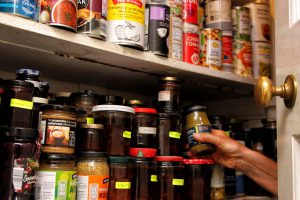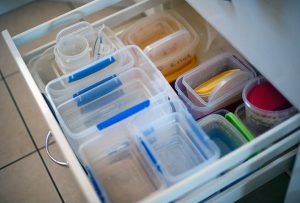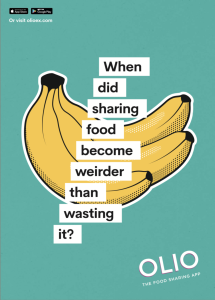Love Food Hate Waste Savour your surplus
Savour your surplus
We’re purposefully using the words “surplus food” rather than leftovers as some people don’t like to eat leftovers. The word ‘leftovers’ can conjure images of food that’s already been served and not eaten.
There are three options for dealing with surplus food:
- Eat it in another meal
- Save it for another time
- Give it to someone else so they can eat / save it
Cooking with surplus food
Realistically there can be challenges to bringing together lots of different foods and flavours to make a tempting meal. There can be a challenge in using up small quantities of foods, and as surplus food is often unexpected, you might not have much time to plan how best to deal with these issues.
A good solution to all the above is to have a decent stock of store cupboard essentials to draw upon. These should be long lasting foods that either help you to bulk out your surplus, or which add flavour; enabling you to make a range of decent meals from whatever you have at home. Tailor the contents of your store cupboard to suit your cooking style and your favourite flavours, but here’s an example list of store cupboard ingredients which might be useful:
|
Balsamic vinegar |
Herbs | Mustard | Dried rice | Stock cubes |
| Chutney | Honey | Dried noodles | Salt | Sunflower oil |
| Crushed chilies | Jalapenos | Olive oil | Sardines | Tabasco |
| Curry paste | Ketchup | Paprika | Stir fry sauce | Butter beans |
| Dry pasta | Worcestershire sauce | Peppercorn | Sesame oil | Coconut milk |
| Flour | Marmite | Raisins | Soy sauce |
Tinned tomatoes |
The websites below are worth bookmarking as they enable you to search for recipes based on the random ingredients you have to hand:
Once you’ve found a recipe, bear in mind that it is just inspiration. Do experiment with different quantities of ingredients, substitute ingredients, different methods of cooking and so on.
Save it for another time – storing surplus

An overpacked cupboard makes it hard to keep track of your foods
It’s a good idea to store surplus that needs using up first / before packaged foods in a dedicated area of your fridge or cupboards. If you’ve removed the packaging it might also help to label the food with a use by date (particularly for things like raw meat).
If you are unsure on how best to store any particular item of food these resources might help:
- Love food Hate Waste A-Z of foods – with advice on storage and cooking them
- https://savethefood.com/storage
If you’ve mis-portioned and ended up with more cooked food than you can eat in one sitting these simple guidelines will get you on the right track:
- Cool the food as quickly as possible, ideally within 2 hours.
- Divide the food into individual portions and refrigerate or freeze.
- Use refrigerated leftovers within 2 days.
- When reheating food, make sure it is heated until it reaches a temperature of 70oC for 2 minutes, so that it is steaming hot throughout.
- Always defrost frozen foods completely, either in the fridge or in the microwave.
- When defrosted, food should be reheated only once, because the more times you cool and reheat food, the higher the risk of food poisoning.
- Cooked food that has been frozen and removed from the freezer should be reheated and eaten within 24 hours of fully defrosting.
- Foods stored in the freezer, such as ice cream and frozen desserts, should not be returned to the freezer once they have thawed / melted.
- For safety and to reduce waste, only take out of the freezer what you intend to use within the next 24 hours.

Many people have a drawer or cupboard full of plastic food containers, which are great for storing surplus foods. Don’t replace plastic containers until you have to.
If you are keeping your surplus in the fridge or freezer, you might also be wondering if / how to reduce your use of plastics in the kitchen. Wax wraps, reusable silicone covers and suchlike certainly have a place in the kitchen and can help to reduce your plastic consumption. However, don’t be too hasty to ditch plastics if you’ve already got them and they are working well for you, or if you’re in the habit of reusing plastic takeaway containers, margarine tubs etc. and giving them an bit of extra life before recycling them.
If your reusable plastic containers are helping you to keep food waste out of the bin, stick with them until they wear out and you need to replace them. At that point consider replacing them with plastic-free alternatives.
Keep in mind that that clean plastic bags and film can be recycled via your kerbside recycling collection in most parts of Leicestershire, as well as in many supermarkets. Discarding unused cling-wrap or plastic bags because you’ve switched to wax wraps is simply adding to the waste problem. Use up what you have before you make the switch.
Sharing Surplus
If you really can’t make use of your surplus food, if for example your freezer is full, or you’re going on holiday, it’s better to offer the food to someone else who might want it rather than immediately heading for the bin.
Sharing with friends and neighbours is a good way to start, but you could try using:
- Olio – a website and app that connects you to other people and food businesses who want to share food.
- Visit your nearest Community Fridge – these are hubs for food swapping, meaning you don’t have to coordinate a collection yourself.

Visit www.olioex.com for more info
Make use of surplus from elsewhere
Accessing surplus food from elsewhere can be a great way to reduce your food shopping bill even further. As well as using Community Fridges and apps to pass on surplus, you can also use them to access heavily discounted food. However, it’s only worth accessing cheap surplus foods if you’re able to make use of them, if you’ve already exhausted your own surplus and made the most of the foods you already have. The list below shows a few places where you can access surplus food at discounted prices:
Olio – Olio is a great place to find surplus food as well as to offer it to others.
Too Good To Go – Links you with shops and other businesses who are offering discounts on surplus food in an effort to prevent it from going to waste.
Karma – Links you with shops and businesses.
FoodCloud – Great for community groups and charities looking for food donations.
Also in Love Food Hate Waste Sub menu










